Sir John Monash, Personal Files Book 12, 3 April - 30 April 1916, Part 5
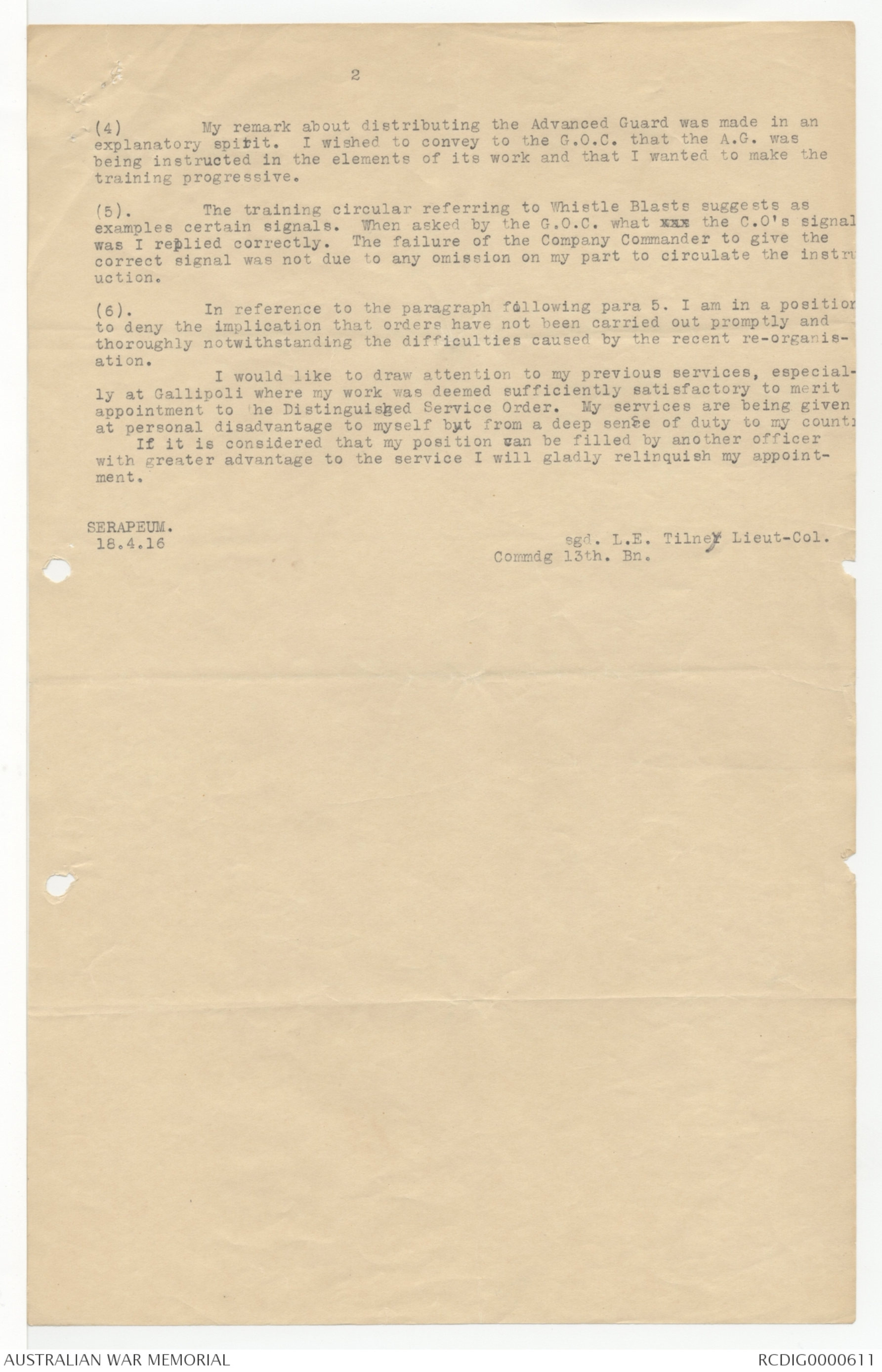
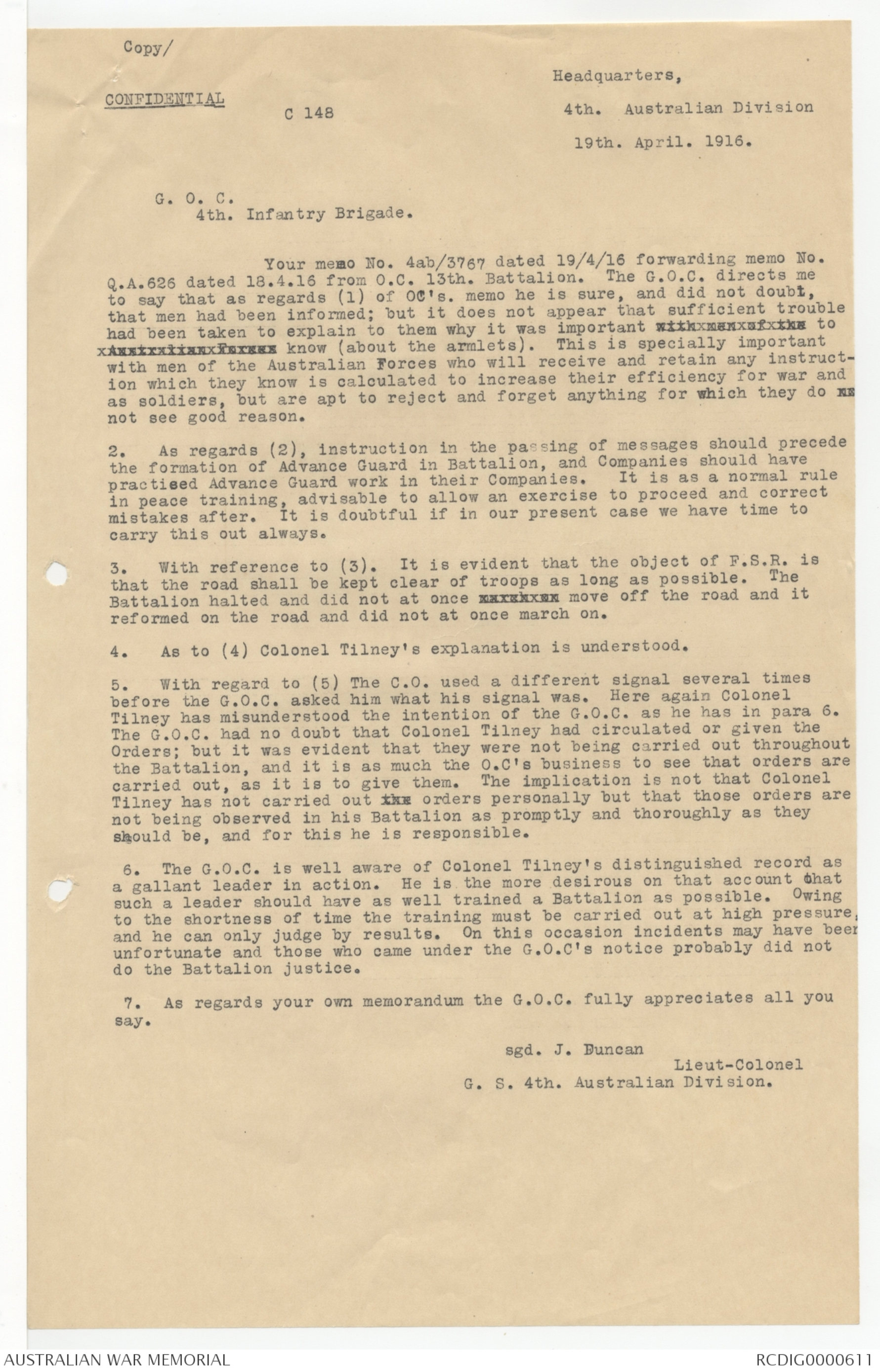
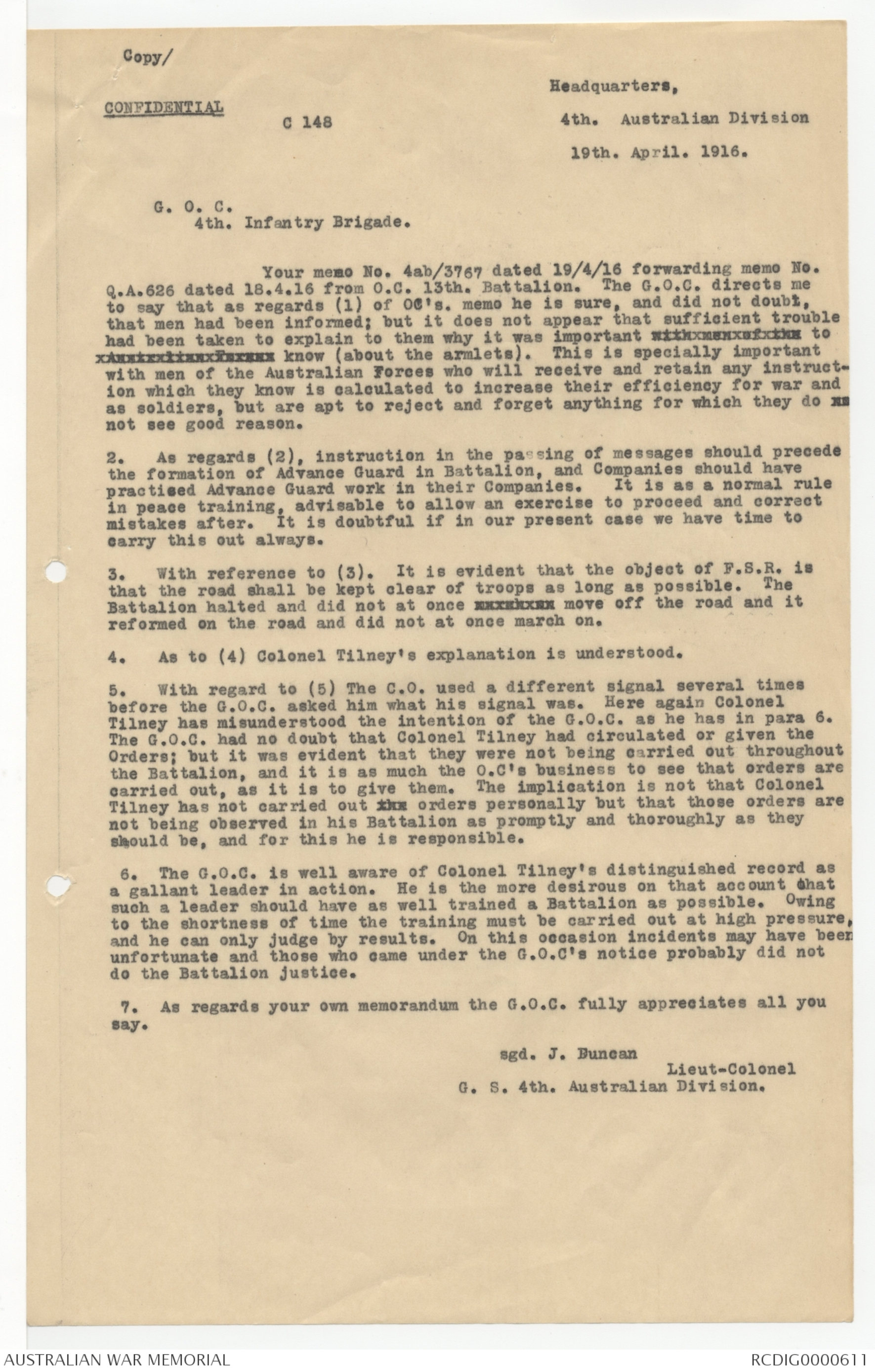
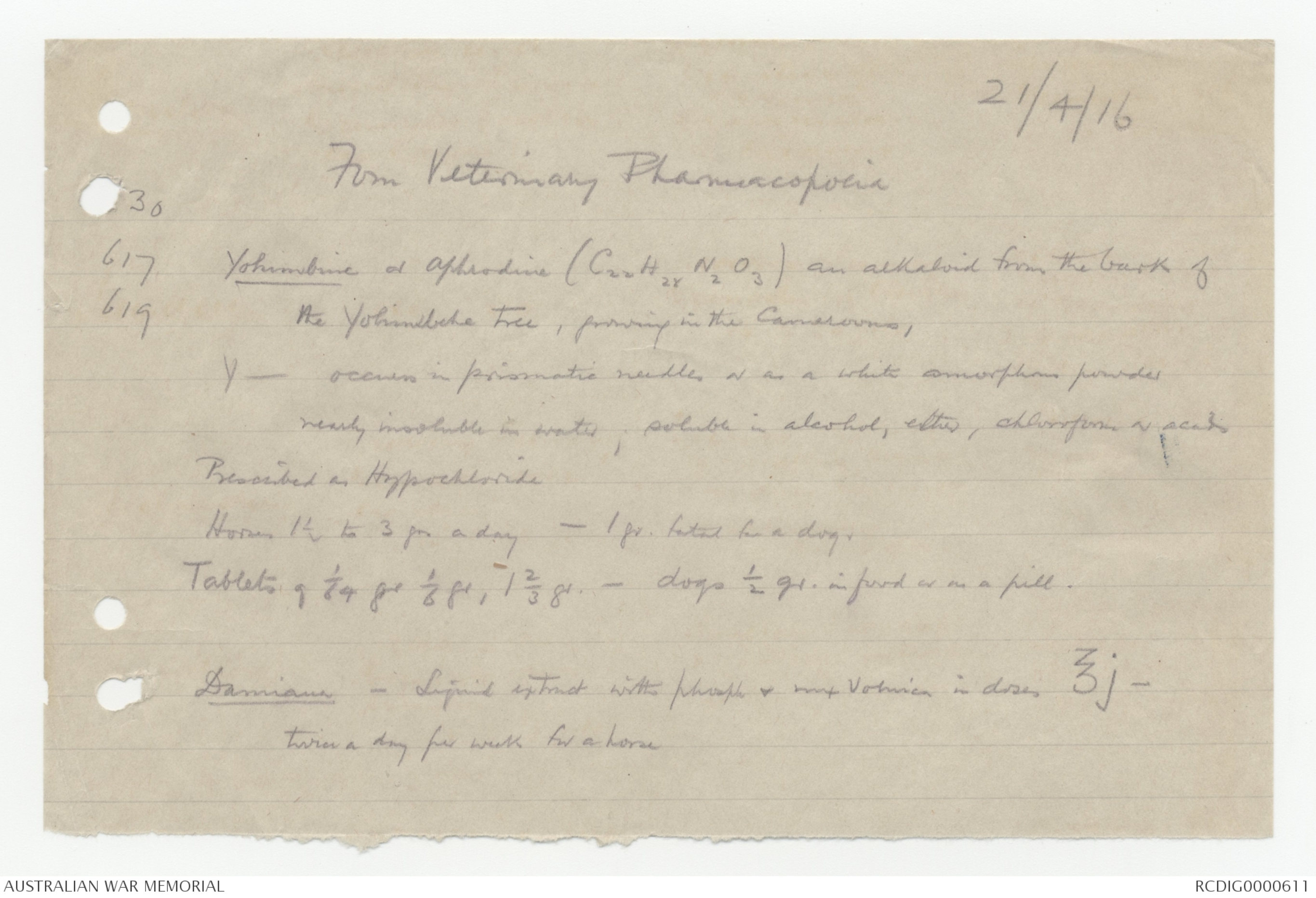
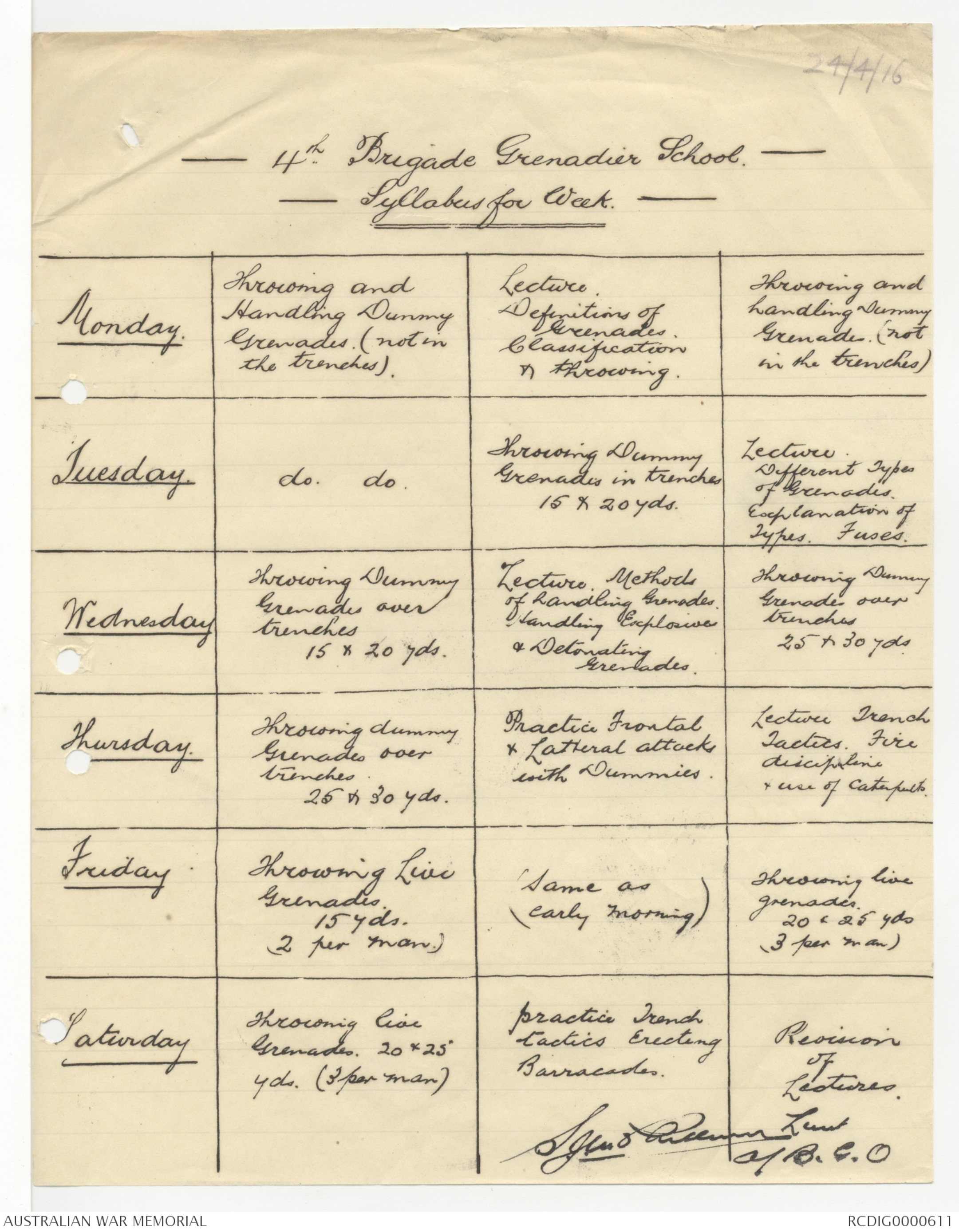
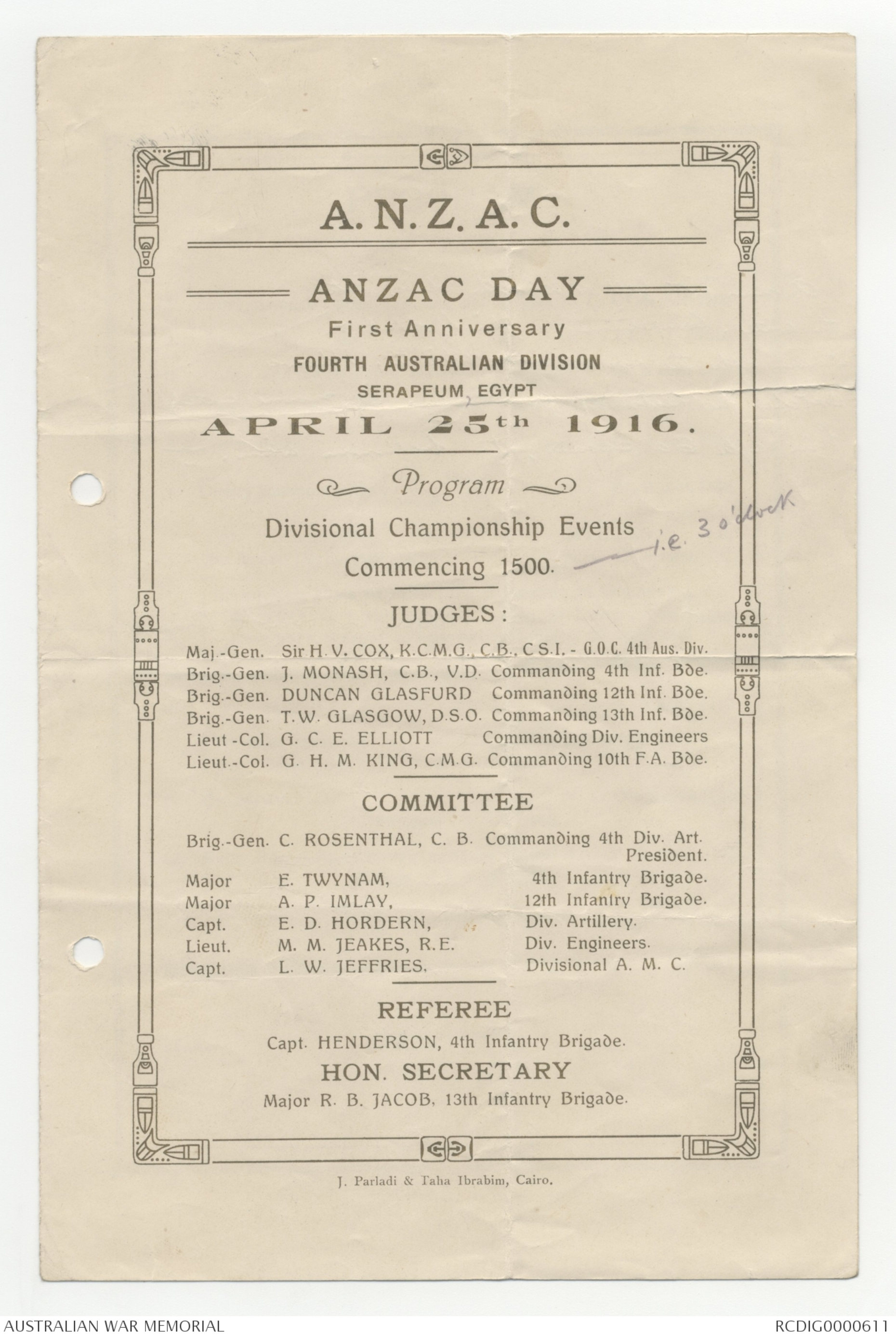
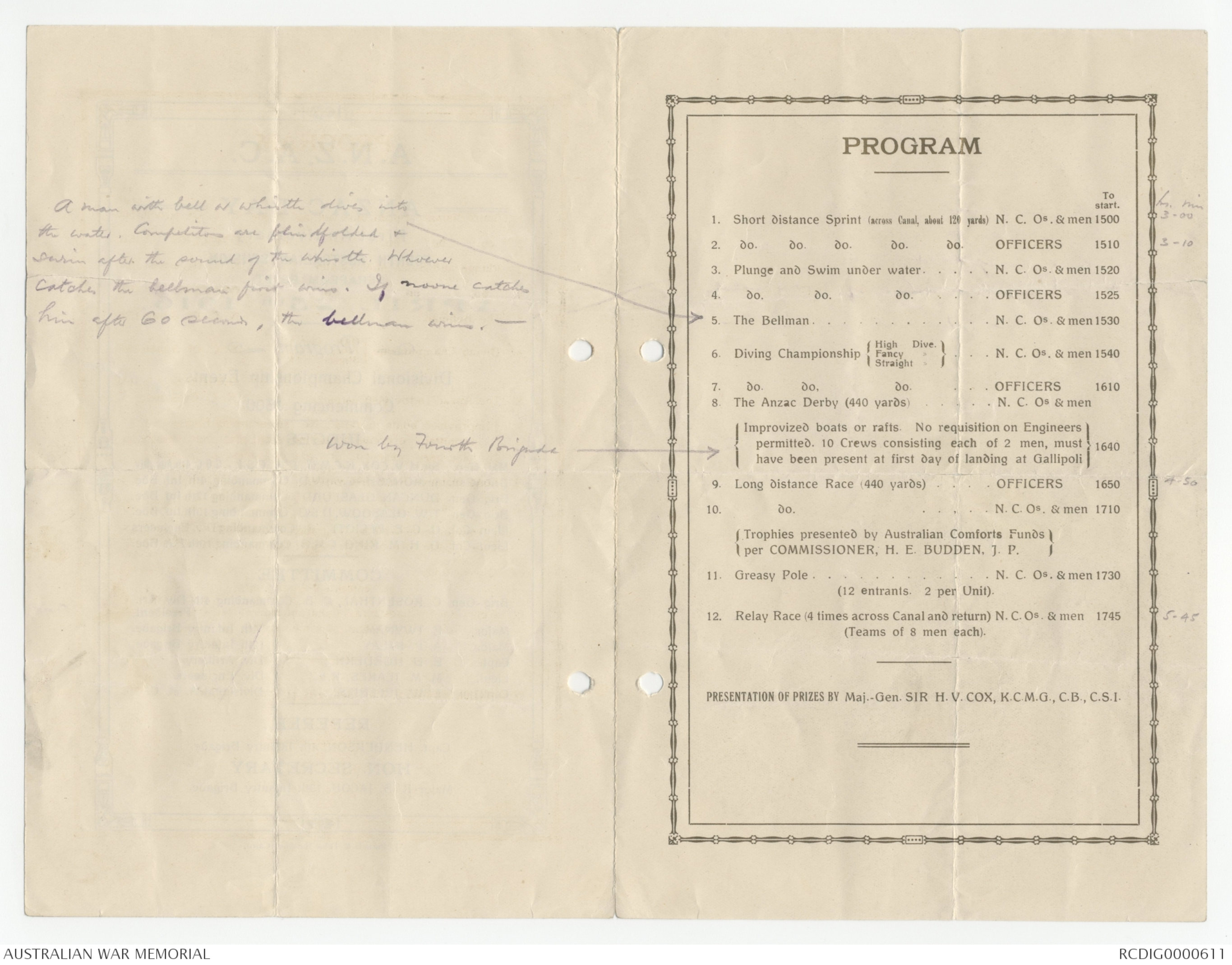
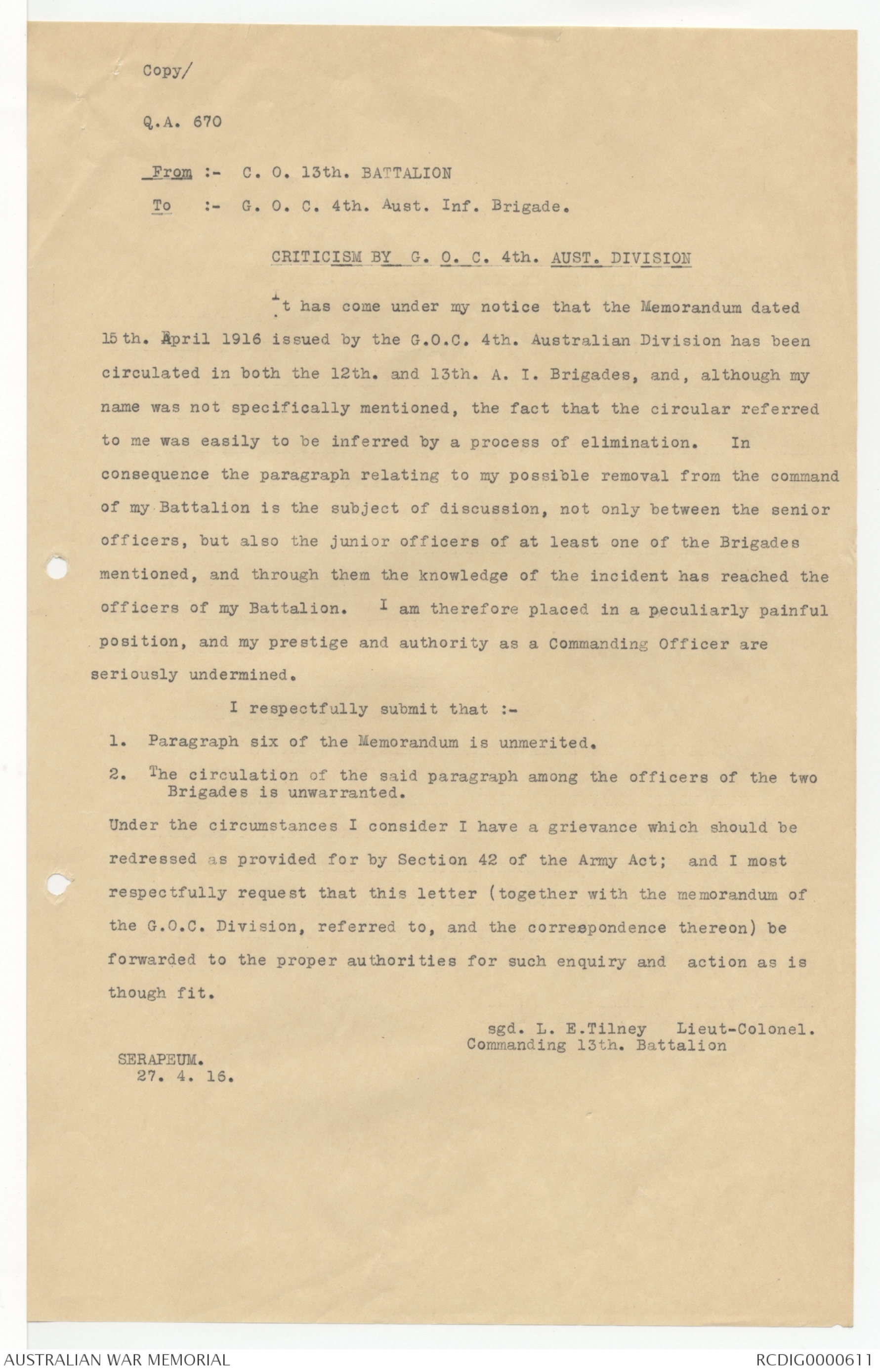
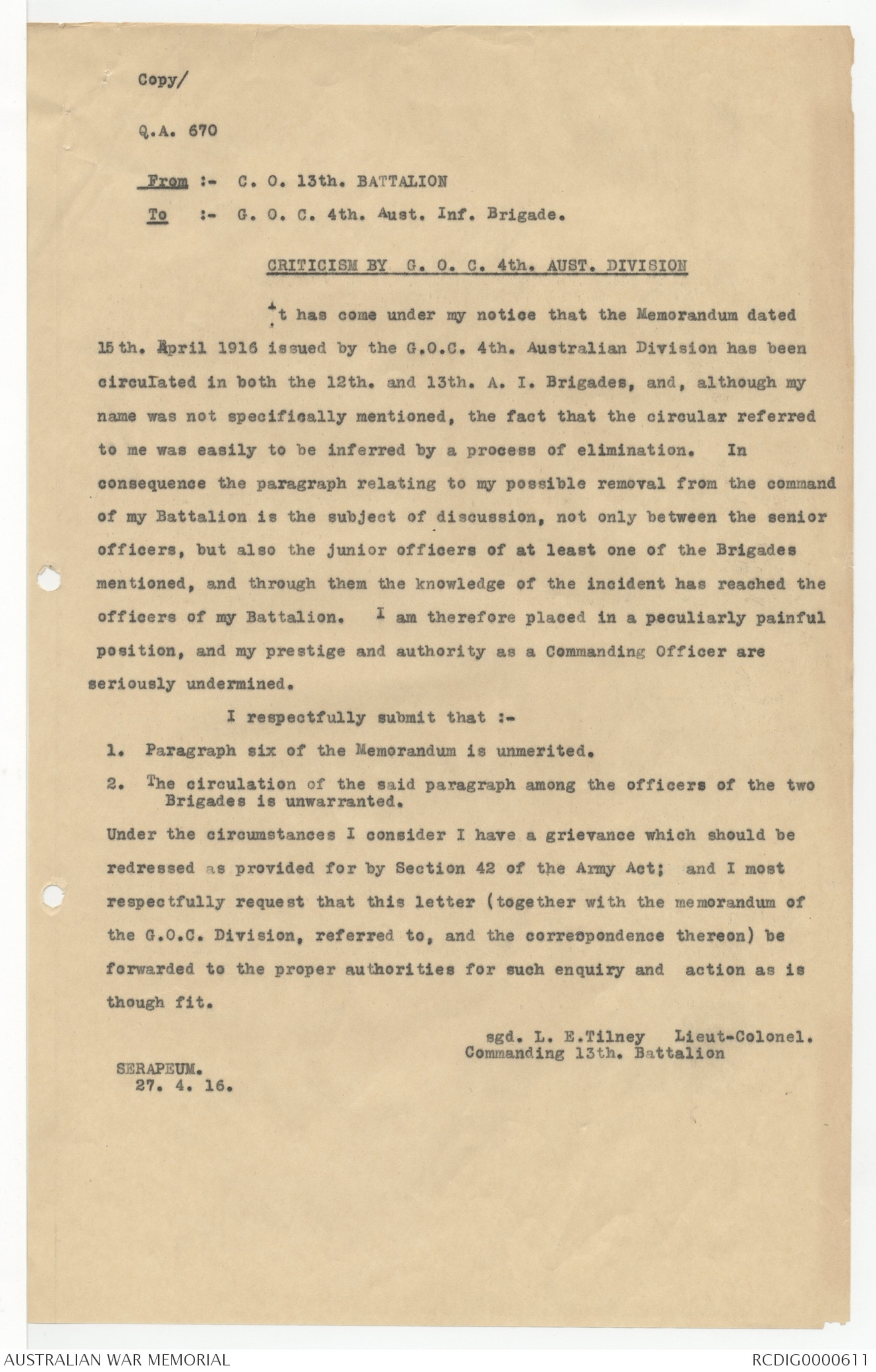
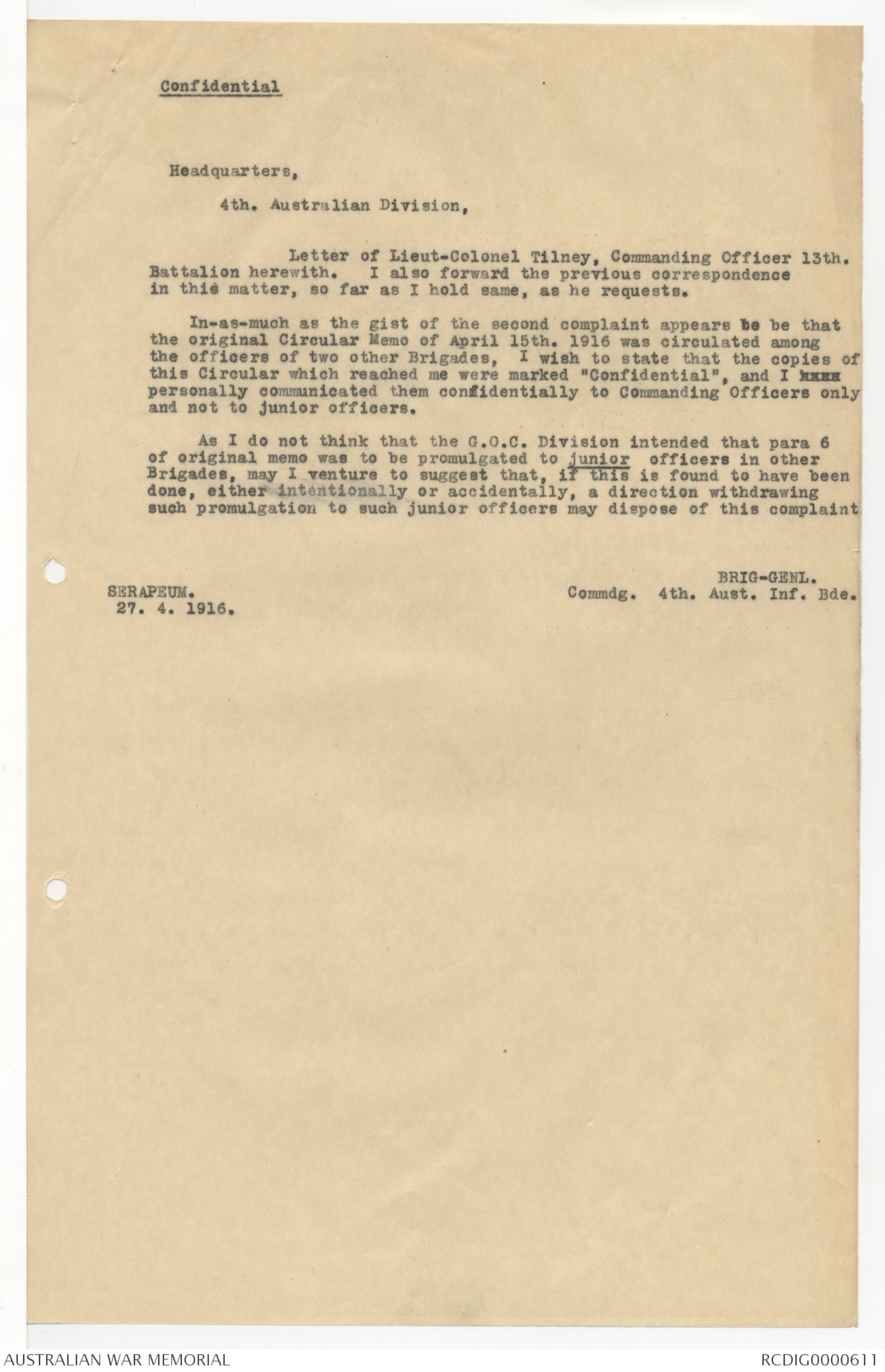
2
(4) My remark about distributing the Advanced Guard was made in an
explanatory spirit. I wished to convey to the G.O.C. that the A.G. was
being instructed in the elements of its work and that I wanted to make the
training progressive.
(5). The training circular referring to Whistle Blasts suggests as
examples certain signals. When asked by the G.O.C. what was the C.O's signal
was I replied correctly. The failure of the Company Commander to give the
correct signal was not due to any omission on my part to circulate the
instruction.
(6). In reference to the paragraph following para 5. I am in a position
to deny the implication that orders have not been carried out promptly and
thoroughly notwithstanding the difficulties caused by the recent
re-organisation.
I would like to draw attention to my previous services, especially
at Gallipoli where my work was deemed sufficiently satisfactory to merit
appointment to the Distinguished Service Order. My services are being given
at personal disadvantage to myself but from a deep sense of duty to my country.
If it is considered that my position can be filled by another officer
with greater advantage to the service I will gladly relinquish my appointment.
SERAPEUM.
18.4.16
sgd. L.E. Tilney Lieut-Col.
Commdg 13th. Bn.
Copy/
Headquarters,
4th. Australian Division
19th. April. 1916.
CONFIDENTIAL
C 148.
G.O.C.
4th. Infantry Brigade.
Your memo No. 4ab/3787 dated 19/4/16 forwarding memo No.
Q.A. 626 dated 18.4.16 from O.C. 13th. Battalion. The G.O.C. directs me
to say that as regards (1) of OC's. memo he is sure, and did not doubt,
that men had been informed; but it does not appear that sufficient trouble
had been taken to explain to them why it was important with men of the toAustralian Forces know (about the armlets). This is specially important
with men of the Australian Forces who will receive and retain any instruction which they know is calculated to increase their efficiency for war and
as soldiers, but are apt to reject and forget anything for which they do no
not see good reason.
2. As regards (2), instruction in the passing of messages should precede
the formation of Advance Guard in Battalion, and Companies should have
practiced Advance Guard work in their Companies. It is as a normal rule
in peace training, advisable to allow an exercise to proceed and correct
mistakes after. It is doubtful if in our present case we have time to
carry this out always.
3. With reference to (3). It is evident that the object of F.S.R. is
that the road shall be kept clear of troops as long as possible. The
Battalion halted and did not at once march on move off the road and it
reformed on the road and did not at once march on.
4. As to (4) Colonel Tilney's explanation is understood.
5. With regard to (5) The C.O. used a different signal several times
before the G.O.C. asked him what his signal was. Here again Colonel
Tilney has misunderstood the intention of the G.O.C. as he has in para 6.
The G.O.C. had no doubt that Colonel Tilney had circulated or given the
Orders; but it was evident that they were not being carried out throughout
the Battalion, and it is as much the O.C's business to see that orders are
carried out, as it is to give them. The implication is not that Colonel
Tilney has not carried out the orders personally but that those orders are
not being observed in his Battalion as promptly and thoroughly as they
should be, and for this he is responsible.
6. The G.O.C. is well aware of Colonel Tilney's distinguished record as
a gallant leader in action. He is the more desirous on that account that
such a leader should have as well trained a Battalion as possible. Owing
to the shortness of time the training must be carried out at high pressure,
and he can only judge by results. On this occasion incidents may have been
unfortunate and those who came under the G.O.C's notice probably did not
do the Battalion justice.
7. As regards your own memorandum the G.O.C. fully appreciates all you
say.
sgd. J. Duncan
Lieut-Colonel
G. S. 4th. Australian Division.
Copy/
Headquarters,
4th. Australian Division
19th. April. 1916.
CONFIDENTIAL
C 148
G.O.C.
4th. Infantry Brigade.
Your memo No. 4ab/3757 dated 1s/4/16 forwarding memo No.
Q.A. 626 dated 18.4.16 from O.C. 13th. Battalion. The G.O.C. directs me
to say that as regards (1) of OC's. memo he is sure, and did not doubt,
that men had been informed; but it does not appear that sufficient trouble
had been taken to explain to them why it was important with men of the toAustralian Forces know (about the armlets). This is specially important
with men of the Australian Forces who will receive and retain any instruction
which they know is calculated to increase their efficiency for war and
as soldiers, but are apt to reject and forget anything for which they do xxx
not see good reason.
2. A. regards (2), instruction in the passing of messages should precede
the formation of Advance Guard in Battalion, and Companies should have
practiced Advance Guard work in their Companies. It is as a normal rule
in peace training, advisable to allow an exercise to proceed and correct
mistakes after. It is doubtful if in our present case we have time to
carry this out always.
3. With reference to (3). It is evident that the object of F.S.R. is
that the road shall be kept clear of troops as long as possible. The
Battalion halted and did not at once move off the road and it
reformed on the read and did not at once march on move off the road and it
reformed on the road and did not at once march on.
4. As to (4) Colonel Tilney's explanation is understood.
5. With regard to (5) The C.O. used a different signal several times
before the G.O.C. asked him what his signal was. Here again Colonel
Tilney has misunderstood the intention of the G.O.C. as he has in para 6.
The G.O.C. had no doubt that Colonel Tilney had circulated or given the
Orders; but it was evident that they were net being carried out throughout
the Battalion, and it is as much the O. C's business to see that orders are
carried out, as it is to give them. The implication is not that Colonel
Tilney has not carried out the orders personally but that those orders are
net being observed in his Battalion as promptly and thoroughly as they
should be, and for this he is responsible.
6. The G.O.C. is well aware of Colonel Tilney's distinguished record as
a gallant leader in action. He is the more desirous on that account that
such a leader should have as well trained s Battalion as possible. Owing
to the shortness of time the training must be carried out at high pressure
and he can only judge by results. On this occasion incidents may have been
unfortunate and those who came under the G.O.C's notice probably did not
do the Battalion justice.
7. As regards your own memorandum the G.O.C. fully appreciates all you
say.
sgd. J. Duncan
Lieut-Colonel
G. S. 4th. Australian Division.
21/4/16
Form Veterinary Pharmacopoeia
630
617 Yohimbine or aphrodine (C22H28N203) an alkaloid from the bark of
619 the Yohimbine Tree, growing in the Cameroons,
Y - occurs in prismatic needles or as white amorphous powder
nearly insoluble in water, soluble in alcohol, either, chloroform & acids
Prescribed in Hypochloride
Horses 1½ to 3 gm a day - 1gr fatal for a dog.
Tablets g 1/64 gr 1/6 gr. 1 2/3 gr - dogs ½ gr in food or on a pill.
Damiana - Liquid extract with phosph & mg vonina in dozes 2/3 j-
twice a day for week for a horse.
24/4/16
4th Brigade Grenadier School
Syllabus for Week
| Monday | Throwing and Handling Dummy Grenades (not in the trenches). |
Lecture. Definition of Grenades. Classification & throwing |
Throwing and handling Grenades, (not in the trenches) |
| Tuesday | do. do. | Throwing Dummy Grenades in trenches 15 x 20 yds |
Lecture Different Types of Grenades. Explanation of Types. Fuses. |
| Wednesday | Throwing Dummy Grenades over trenches 15 x 20 yds |
Lecture. Methods Handling explosive |
Throwing Dummy Grenade over trenches 25 to 30 yds |
| Thursday | Throwing dummy Grenade over trenches 25 to 30 yrds |
Practice Frontal x Latteral attack with Dummies |
Lecture Trench Tactics. Fire discipline & use of catapult |
| Friday | Throwing Live Grenades 15 yds 2 per man) |
(Same as early morning) |
Throwing live grenades. 20 x 25 yds 3 per man) |
| Saturday | Throwing live Grenades 20 x 25 yds (3 per man) |
Practice trench tactics erecting Barricades |
Revision of Lectures |
Sgnd L Cullum Lieut
a/B.O.C
A.N.Z. A. C.
ANZAC DAY
First Anniversary
FOURTH AUSTRALIAN DIVISION
SERAPEUM, EGYPT
APRIL 25th 19I6.
Program
Divisional Championship Events
Commencing 1500.
[*i.e. 3 o'clock*]
JUDGES:
Mai-Gen. Si H. V. COX, K C.M.G ,CB. C.S.I- GOC 4tj Aus. Divn.
Brig-Gen. J MONASH, C.B, V.D. Commanding 4th Inf Bde
Brig-Gen. DUNCAN GLASFURD Commanding 12th Inf Bde.
Brig-Gen. T.W. GLASGOW, D.S.O. Commanding 13th Inf. Bde
Lieut-Col G. C E. ELLIOTT Commanding Div. Engineers
Lieut-Col G. H. M. KING, C.M.G. Commanding 1Oth F.A. Bde.
COMMITTEE
Brig-Gen. C ROSENTHAL, C. B. Commanding 4th Div. Art
President.
4th Infantry Brigade.
| Major | E. TWVNAM, | 4th Infantry Brigade |
| Major | A.P. IMLAY | 12th Infantry Brigade |
| Capt. | E.D. HORDERN, | Div Artillery |
| Lieut. | M.M. JEAKES, R.E | Div. Engineers |
| Capt. | L.W. JEFFRIES | Divisional A.M.C |
REFEREE
Capt HENDERSON, 4th Infantry Brigade.
HON SECRETARY
Major R. B. JACOB, 13th Infantry Brigade.
J. Parladi & Taha Ibrabim, Cairo.
[*A man with bell or whistle dives into
the water. Competitors are blindfolded &
swim after the sound of the whistle. Whoever
catches the bellman first wins. If noone catches
him after 60 seconds, the bellman wins.*]
PROGRAM
| To start |
[*hrs mins | |||
| 1. | Short distance Sprint (across Canal, about 120 yards) | N.C.Os. & men | 1500 | 3.00 |
| 2 | do. do. do. do. do. | OFFICERS | 1510 | 3.10 |
| 3. | Plunge and Swim under water .............................................. | N.C.Os. & men | 1520 | |
| 4. | do. do. do. do. .............................................. | OFFICERS | 1525 | |
| 5. | The Bellman .......................................................................................... | N.C.Os. & men | 1530 | |
| 6. | Diving Championship (High Dive) (Fancy ) (Straight ) |
N.C.Os. & men | 1540 | |
| 7. | do. do. do. do. .............................................. | OFFICERS | 1610 | |
| 8 | The Anzac Derby (440 yards) (Improvized boats or rafts. No requisition on Engineers) (permitted. 10 Crews consisting of 2 men, must ) (have been present at first day of landing at Gallipoli ) [*Won by Fourth Brigade*] |
N.C.Os. & men | 1640 | |
| 9 | Long Distance Race (440 yards) .............................................. | OFFICERS | 1650 | 4.50 |
| 10 | do .............................................. | N.C.Os. & men | 1710 | |
| 11. | Greasy Pole .......................................................................................... | N.C.Os. & men | 1730 | |
| 12. | Relay Race (4 times across Canal and return) | N.C.Os. & men | 1745 | 5.45*] |
PRESENTATION OF PRIZES Maj-Gen SIR H.V.COX, K.C.M.G, C.B, C.S.I
Copy/
Q.A. 670
From :- C. O. 13th. BATTALION
To :- G. 0. C. 4th. Aust. Inf. Brigade.
CRITICISM BY G. O. C. 4th. AUST. DIVISION
It has come under my notice that the Memorandum dated
15 th. April 1916 issued by the G.O.C. 4th. Australian Division has been
circulated in both the 12th. and 13th. A. I. Brigades, and, although my
name was not specifically mentioned, the fact that the circular referred
to me was easily to be inferred by a process of elimination. In
consequence the paragraph relating to my possible removal from the command
of my Battalion is the subject of discussion, not only between the senior
officers, but also the junior officers of at least one of the Brigades
mentioned, and through them the knowledge of the incident has reached the
officers of my Battalion. I am therefore placed in a peculiarly painful
position, and my prestige and authority as a Commanding Officer are
seriously undermined.
I respectfully submit that :-
1. Paragraph six of the Memorandum is unmerited.
2. The circulation of the said paragraph among the officers of the two
Brigades is unwarranted.
Under the circumstances I consider I have a grievance which should be
redressed as provided for by Section 42 of the Army Act; and I most
respectfully request that this letter (together with the memorandum of
the G.O.C. Division, referred to, and the correspondence thereon) be
forwarded to the proper authorities for such enquiry and action as is
though fit.
sgd. L. E. Tilney Lieut-Colonel.
Commanding 13th. Battalion
SERAPEUM.
27. 4. 16.
Copy/
Q.A. 670
From :- C. O. 13th. BATTALION
To :- G. 0. C. 4th. Aust. Inf. Brigade.
CRITICISM BY G. O. C. 4th. AUST. DIVISION
It has come under my notice that the Memorandum dated
15 th. April 1916 issued by the G.O.C. 4th. Australian Division has been
circulated in both the 12th. and 13th. A. I. Brigades, and, although my
name was not specifically mentioned, the fact that the circular referred
to me was easily to be inferred by a process of elimination. In
consequence the paragraph relating to my possible removal from the command
of my Battalion is the subject of discussion, not only between the senior
officers, but also the junior officers of at least one of the Brigades
mentioned, and through them the knowledge of the incident has reached the
officers of my Battalion. I am therefore placed in a peculiarly painful
position, and my prestige and authority as a Commanding Officer are
seriously undermined.
I respectfully submit that :-
1. Paragraph six of the Memorandum is unmerited.
2. The circulation of the said paragraph among the officers of the two
Brigades is unwarranted.
Under the circumstances I consider I have a grievance which should be
redressed as provided for by Section 42 of the Army Act; and I most
respectfully request that this letter (together with the memorandum of
the G.O.C. Division, referred to, and the correspondence thereon) be
forwarded to the proper authorities for such enquiry and action as is
though fit.
sgd. L. E. Tilney Lieut-Colonel.
Commanding 13th. Battalion
SERAPEUM.
27. 4. 16.
Confidential
Headquarters,
4th. Australian Division,
Letter of Lieut-Colonel Tilney, Commanding Officer 13th.
Battalion herewith. I also forward the previous correspondence
in this matter, so far as I hold same, as he requests.
In-as-much as the gist of the second complaint appears be be that
the original Circular Memo of April 15th. 1916 was circulated among
the officers of two other Brigades, I wish to state that the copies of
this Circular which reached me were marked "Confidential", and I xxx
personally communicated them confidentially to Commanding Officers only
and not to junior officers.
As I do not think that the G.O.C. Division intended that para 6
of original memo was to be promulgated to junior officers in other
Brigades, may I venture to suggest that, if this is found to have been
done, either intentionally er accidentally, a direction withdrawing
such promulgation to such junior officers may dispose of this complaint
BRIG-GENL.
SERAPEUM
Commdg. 4th. Aust. Inf. Bde.
27. 4. 1916.
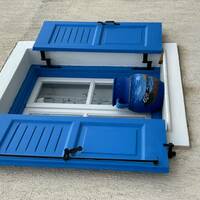 Jen
Jen This transcription item is now locked to you for editing. To release the lock either Save your changes or Cancel.
This lock will be automatically released after 60 minutes of inactivity.